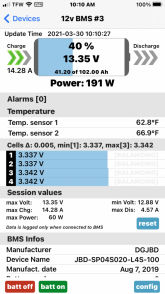Thanks for this.
Based on both of our experiences, my take-away is that these portable 12V fridges use ~ one V/day. I began at 12.6V and ended up at ~10.5V after two days. Had my battery been able to start at a 14.4V charge, considering an ~ one V/day drop, I'd end up with ~ 20% left after four days, which, if you account for your battery's additional 10% of battery capacity, mirrors my results.
Please don't think like this. This is in no way a meaningful way of contemplating this issue. You have made a connection where none exists. Had you been able to start at 14.4V charge, your Apex likely would have caught fire before then as you would have severely over-charged the unit and ran the fridge for 0 seconds.
Batteries start with a full state of charge and and empty state of charge. The voltage range is a function of the chemistry and is not a reliable way of looking at it.
Had
@MrNatural22 waited 24 hours AFTER charging the battery, his battery voltage would have settled to around 13.8V and still had 100% capacity remaining. In a month, it would have been 13.3V and STILL had at least 97% of its capacity remaining.
So, had he delayed test start 30 days, he would have gone from 13.3V to 12.88V in 5 days.. <0.1V/day
So, taken en toto, I have to conclude that the answer to my original (bottom line) question is that there's no way to get there from here (i.e., there's no trick or hidden feature that'll allow the Apex to run all the gadgets I cited for a week on a single [full 12.6V] charge.
I indicated that in post #3.

So, again, my sincere thanks to all who contributed their time, effort and experience to this thread. I leave with the same understanding I arrived with, but with a whole lotta more understanding. Thank you All.
You were on the right track, but I'm really concerned that you're walking away from this with this "volts per day" hooey in your head. Please discard it.
INDEPENDENT OF BATTERY CHEMISTRY AND VOLTAGE,
Wh capacity is the
only reliable way to directly compare battery capacities if they're a different chemistry or nominal voltage.
Consider a simple 50W RESISTIVE load (not a motor that may change efficiencies at different voltages):
Your 1100Wh battery can deliver 50W for 1100/50 = 22 hours.
His 1305Wh battery can deliver 50W for 1305/50 = 26 hours.



